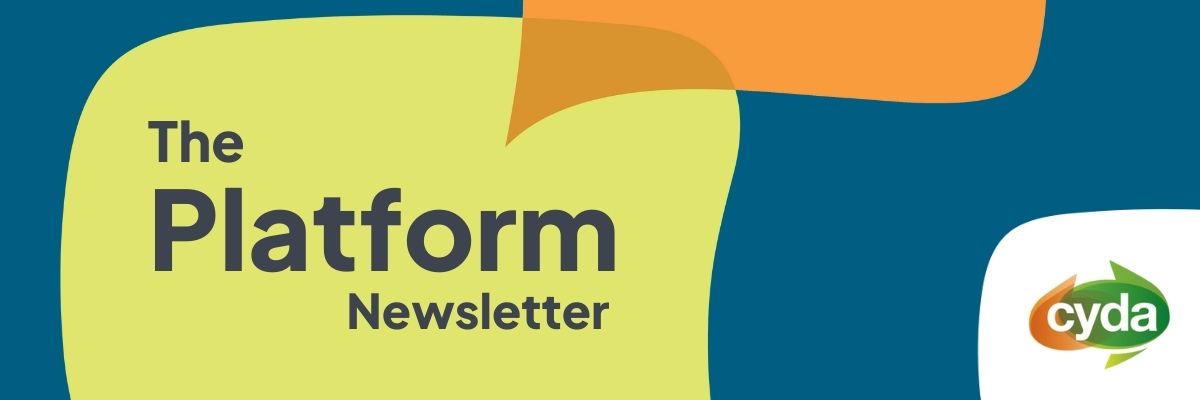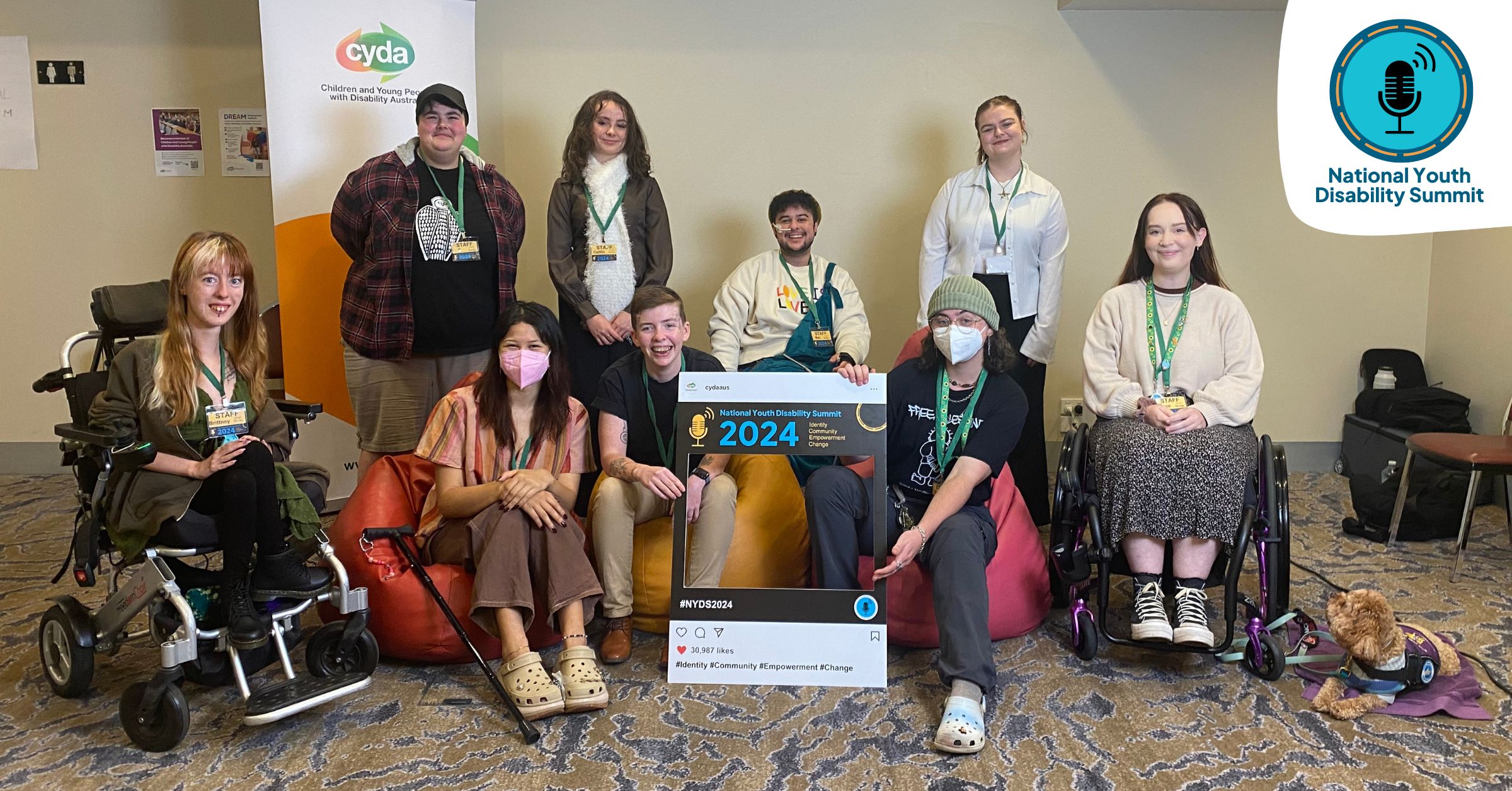My empowerment journey
CYDA Youth Councillor Ezra Burnett reflects on what they’ve learned about identity, empowerment, and self-advocacy.
Empowerment was one of the topics we discussed at the 2024 National Youth Disability Summit.
To be empowered means having the confidence, knowledge, ability, or resources to do things you want to do. It allows your world to open up and gives you the internal belief to self-advocate in your communities more and more as you find your voice and learn how to share your story. Becoming empowered is an ongoing process and a challenging task, especially when you face external obstacles.
Self-advocacy, on the other hand, is about being able to speak up for your rights, needs, and things that are important to you. The more you self-advocate, the more your self-esteem grows and the more empowered you feel. Self-advocacy and empowerment are deeply interconnected; combining them creates a positive upward spiral in life.
Engaging in many conversations with Summit participants in person and online had me thinking about my own journey towards feeling empowered these past few years.
For a long time, I felt disempowered in my life – the exact opposite of empowerment. If you’d told me a couple of years ago, that I would end up joining CYDA’s Youth Council or organising, designing and facilitating an official summit for young disabled people nationwide, I wouldn’t have believed you. That’s because being disempowered eroded my self-esteem and tricked my brain into thinking that I couldn’t do anything.
Back then, I didn’t stand up for myself or self-advocate. I had zero sense of self-worth, very few self-care habits, and didn’t feel like I had power over the direction of my life. I struggled to reach out for help, kept all my problems inside of me, and ended up creating a cesspool of internal shame and guilt. I swam in that for years and allowed its dangerous current to pull me in a negative, downward direction.
When I felt disempowered, I struggled to embrace my identity as a disabled person. My internalised ableism at the time was shocking. While I had recently been diagnosed with ME/CFS and fibromyalgia, I still lived in deep denial. Refusing to embrace my reality as a chronically ill and disabled person was horrific for both my mental and physical health. Instead of offering myself self-love and understanding, I pushed myself too hard in my gruelling (overworked and underpaid) hospitality job. Instead of allowing myself to become empowered by learning more about my conditions and capacity, I chastised myself for experiencing PEM (Post Exertional Malaise) crashes a couple of times a week. I absorbed ableist lies around me like my symptoms were “all in my head” or I would “get better soon” if I stopped “slacking off and being lazy.”
The fact that I held onto so much toxic internalised ableism wasn't my fault. Most people are disempowered by society, especially when they live in marginalised bodies.
I had experienced stigma and discrimination for my transgender identity, disability, and sexuality, including from people I had once trusted, as well as medical professionals, and this led to me feeling disempowered. I had not only internalized the ableism previously thrown at me, but the transphobia and homophobia as well. Other previous situations and societal issues had also led to me feeling disempowered, but being attacked for my identity was so personal that it created self-hatred and destruction on a much deeper level.
Identity – or the mixture of experiences, beliefs and attitudes that shape how an individual perceives themselves or is perceived by others – was another one of the themes of this year’s Summit. For me, the more empowered I became, the stronger my sense of identity. The more I self-advocated, the more I felt like my identity was important. The more I felt important, the more empowered I also felt to put my hand up for opportunities.
I am now really proud of my identity, but it took me along time to get to this point in my journey towards empowerment, and I’m honestly only at the tip of the iceberg. Joining and being part of the Youth Council at CYDA played a large role in this, and I’ve loved every minute. It’s been incredible getting to work alongside passionate, dedicated, and insightful young disability advocates from all across so-called Australia.
To think I almost didn’t apply for the position of back in 2023 because I felt so nervous about the possibility of rejection. But a good friend of mine, who also happens to be disabled, hyped me up beforehand. It was because of his support that I felt empowered enough to submit my application in the first place. He reaffirmed me and my identity, and that empowered me to throw my hat in the ring for this opportunity with CYDA.
Growing up, I always believed that empowerment came from within the self. I was stuck in a mentality that I had to do everything, alone. I have learnt so much from the disabled community over the past few years, especially the fact that empowerment comes from community. From the unconditional support and love we provide each other. And while the journey to becoming empowered is a long road, you don’t have to do it alone.
We empower ourselves by empowering each other, and by empowering each other we empower ourselves.
This article is an extract from CYDA’s The Platform Newsletter. Receive monthly updates by subscribing below.

About the author:
Ezra (he/they) is a youth advocate, activist, and aspiring peer support/social worker based in Naarm (Melbourne) on beautiful Wurundjeri land. He is a queer, neurodivergent, chronically ill, transgender man who is passionate about creating systematic change with a focus on intersectionality, lived experience, and accessibility.
Ezra wants to ensure that all young people feel visible and valued within their communities, and he would love to eventually return to living in regional Victoria to help amplify the voices of regional LGBTQIA+ community members. Outside of his work and activism, you’ll find him making art, reading good books, or spending time with his cats or his queer-found family.

The Platform is our newsletter for young people with disability, featuring interviews, opportunities and news on the issues that matter to you!


